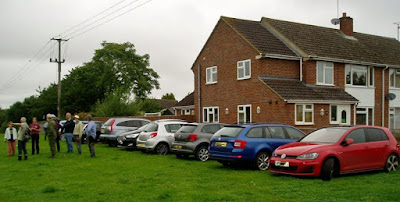By ‘C’:
It’s Tuesday morning, sun comes up nice
and warm, but not too warm – must be a Green-Gym day.
An unusual
start, though. A Green-Gym eleven duly
reported for duty at a site we had not visited in a while. The person we were expecting to liaise with:
not on site, it’s his day off. Never
mind! We had been emailed general
instructions: maintenance & repair of the dead-hedge fence we had built
round the perimeter; and another round of nettle-bashing. Having brought our own tools, we decided to use
our best judgement to decide priorities, and issue ourselves our own orders.
It was
indeed a beautiful day to be outdoors, in a beautiful place, at a beautiful
time of year. What was not to like?
 |
| No mist this morning … |
 |
| but plenty of mellow fruitfulness. |
 |
| In the background: a labyrinth mown in the lawn |
The first
Green-Gym action was one detail carrying out a reconnaissance of the perimeter fence,
starting by the entrance, from where one could glimpse the spacious village-green:
The recce
party found that most of the fence was still sturdy enough: just low in a few
places, where materials had settled. There
were also some stretches where vertical supports were beginning to fail, and
the fill-material was sagging sideways.
The solution? Green-Gymmers found a willow hedge-support
they had hammered in some years ago now growing strongly and anchoring the
hedge. They coppiced it, and used the
branches to make more supports, which – we hope – will in their turn grow, and
make lives easier for future volunteers.
Meanwhile,
those of us who opted for the more destructive of the two tasks found there was
no shortage of targets to choose from.
This was just one patch of many (note the hedge-inspectors in the background):
Having chosen
their target, some nettle-destroyers opted to slash. Here, a dasselbasher in use:
For myself,
I preferred to use my gloved hands to pull rather than slash. There is something sadly satisfying about
reeling in several feet of nettle root!
And it means the return of the nettles will be delayed that little bit
longer. There were other areas, though,
where that was not practical, and a sickle proved a nifty tool:
What to do
with the very great quantities of cut stuff?
In places, it seemed sensible to tidy away in small heaps beneath other
vegetation. I noticed that behind me,
however, other Green-Gymmers were spontaneously loading cuttings into barrow,
presumably with the intention of wheeling the spoil over to the compost heap:
When we were
scattered across a large site, gathering us all together for our tea-break was a
challenge. The setting was highly
civilised: an actual table, with places to sit, on the edge of a fine lawn
facing the main house, in the shade of a most convenient and handsome tree:
The tree
proved to be a main topic of conversation.
What kind of a tree was it?
Green-Gymmers studied the bark, looked up and admired the height and
shape of the tree, noted the form of the leaves, and even borrowed a Swiss-Army
knife to dissect one of the fruit:
 |
“It looks
like a London Planetree to me”
|
 |
“No, it’s
definitely some kind of maple”
|
 |
“Well it’s
certainly not a sweet chestnut”
|
Fortunately,
a volunteer gardener was on hand to tell us that those who thought it was a
London Planetree (Platanus
× acerifolia) were right. Cue people sagely announcing, “Ah yes, I thought so.” (I hadn’t a clue myself: I only knew it wasn’t
an oak tree. Or a nettle.)
The
subsidiary topic of conversation round the table was: species of animals kept
at the college, to which one of our number returns next week; and the
surprising range of species to be seen in South Oxfordshire.
By session
end, we had certainly done a great deal, but the results of our efforts were
perhaps not as readily noticeable as at some sessions. This, for instance, is the spot where I
happened to be when the word came, “Session end!” I had not taken a ‘before’ photograph,
because I did not know that there was a bush with these pretty little flowers
there before I began stripping nettles off what I presumed was intended to be a
woodland path. So this is a slightly
ineffectual ‘after’ shot, with which to finish, but sometimes one’s best, is all one can do:





















